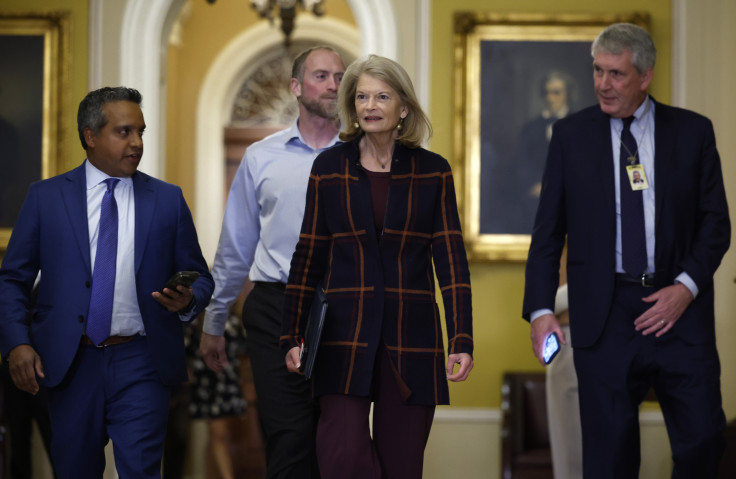
Republican Senator Lisa Murkowski called on fellow GOP members to stand up for the legislative branch of government as the Donald Trump administration moves on with initiatives that would go over it.
Speaking to with NBC News, Murkowski said "when the executive basically blows by Congress or rolls right over Congress and we allow that, we are seating our responsibility."
"I believe that you can absolutely be a 100 percent supporter of President Trump and still stand up for the institution of the Senate, for the legislative branch with our authorities that are prescribed to us specifically by the Constitution," she added.
NEW: GOP Sen. Lisa Murkowski warns her colleagues not to cede their authority to Trump.
— Ryan Nobles (@ryanobles) February 25, 2025
“I believe you can absolutely be 100% supporter of President Trump and still stand up for the institution of the Senate.” w/ @frankthorp pic.twitter.com/JDGVim17Lu
Murkowski added a stark warning: "But if we don't, if we just say, 'Well, we like his policies and so therefore we're going to cede some of our authorities,' don't think that this is the last time you're going to see that."
Back in January, the Latin Times consulted political scientists about non-MAGA Republicans who might pose internal resistance to some of President Donald Trump's directives. Sen. Lisa Murkowski (R-Alaska) was mentioned multiple times.
During the last three months, Murkowski has already challenged President Donald Trump and his administration on various issues, including the proposal to purchase Greenland, Pete Hegseth's nomination as Defense Secretary, and Trump's decision to pardon January 6 Capitol rioters, among other things.
Political experts do not expect many GOP members to follow Murkowski's steps in publicly opposing the Trump administration. However, the recent mass firing of federal employees and Trump's Russia-Ukraine stance have caused pushback from several Republicans.
Sen. Susan Collins (R-Maine) and Sen. John Curtis (R-Utah), as well as Reps. Don Bacon (R-Nebraska), Brian Fitzpatrick (R-Pennsylvania), Rep. Jeff Van Drew (R-New Jersey), and Rep. Doug LaMalfa (R-California), have recently labeled some of the Trump administration's actions as "embarrassing," "cruel," and "absurd."
In this context, the Republican-led House is preparing to vote on a Trump-backed budget resolution that aligns with the president's priorities. The resolution needs at least 218 votes to pass, but given the party's slim majority, opposition from just a few GOP members could block it.
Rep. Tim Burchett (R-TN) stated that five Republican House members do not plan to support the resolution. "I'm not sure why we're holding this vote right now," he said. "It seems like some of us have been excluded from discussions, and I think it would be best to include everyone."
Republican Kentucky Rep. Thomas Massie joined Burchett in criticizing the resolution, particularly the proposed tax cuts. "You can't cut taxes without really cutting spending and they're not really cutting spending," he said. "They're cutting taxes by $450 billion and spending by $150 billion, that leaves you $300 billion that you're going to add to the deficit."
While Republican lawmakers have not necessarily stampeded to support GOP leaders standing up to the Trump administration, political experts have told the Latin Times internal resistance, particularly from non-MAGA lawmakers, is present.
Michael Montgomery, former U.S. diplomat and lecturer at the University of Michigan, cited the fear of being primaried–a tactic used by political parties to block the reelection of candidates they oppose–as a "powerful factor holding GOP members publicly in-line."
Looking ahead, Montgomery said the biggest check on Republican control will be the 2026 midterm elections. The President's party almost always loses the House or Senate during midterms, he noted. "It wouldn't take much Republican overreach to get voters exercised enough to shift control of the House."
Montgomery also highlighted that in 2024, Senate Democrats and Independents had to defend 23 seats, "making a shift to Republican control pretty much inevitable." In 2026, the Republican party will need to defend 20 seats to keep their majority. A scenario that, according to the political expert, could also result in a Senate majority shift.
Most of the GOP members who have publicly challenged the Trump administration are up for re-election in 2026 and 2027, except for Sen. John Curtis (R-Utah), whose term ends in 2031.
© 2025 Latin Times. All rights reserved. Do not reproduce without permission.





